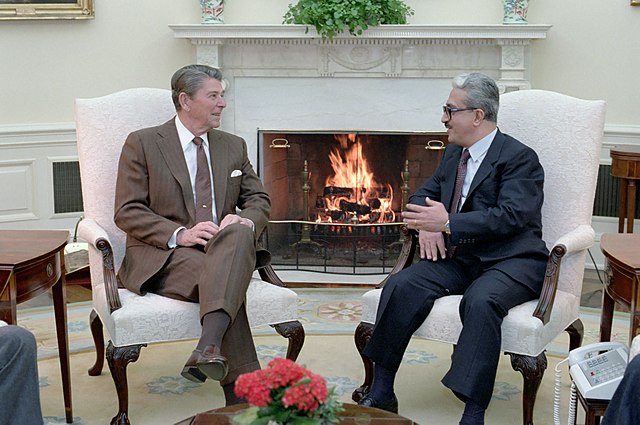Alan Friedman is an American journalist, author, documentary writer and producer, TV anchor and former media and public relations executive.
Alan Friedman in 2014
United States support for Iraq during the Iran–Iraq War
United States support for Ba'athist Iraq during the Iran–Iraq War, in which it fought against post-revolutionary Iran, included several billion dollars' worth of economic aid, the sale of dual-use technology, military intelligence, and special operations training. The U.S. refused to sell arms to Iraq directly due to Iraq's ties to Palestinian groups which the U.S. designates as terrorist organizations such as the Palestinian Liberation Front and Abu Nidal Organization, but several sales of "dual-use" technology have been documented; notably, Iraq purchased 45 Bell helicopters for $200 million in 1985. Of particular interest for contemporary Iran–United States relations are accusations that the U.S. government actively encouraged Iraqi leader Saddam Hussein to invade Iran, supported by a considerable amount of circumstantial evidence and generally regarded as the conventional wisdom in the Arab world, but several scholars and former U.S. government officials deny that any such collusion occurred, and no direct documentary proof of it has been found.

The Iranian Shah Mohammad Reza Pahlavi meeting with President Jimmy Carter and Zbigniew Brzezinski, 1977.
President Ronald Reagan and Vice President George H. W. Bush work in the Oval Office of the White House, July 20, 1984.
Ronald Reagan hosts then-Iraqi foreign minister Tariq Aziz of the Saddam Hussein administration at the White House, 1984
Iraq purchased 8 strains of anthrax from the United States in 1985, according to British biological weapons expert David Kelly. The Iraqi military settled on the American Type Culture Collection strain 14578 as the exclusive strain for use as a biological weapon, according to Charles Duelfer.





